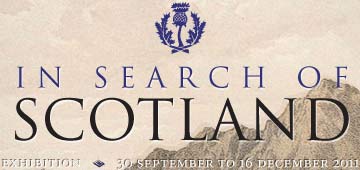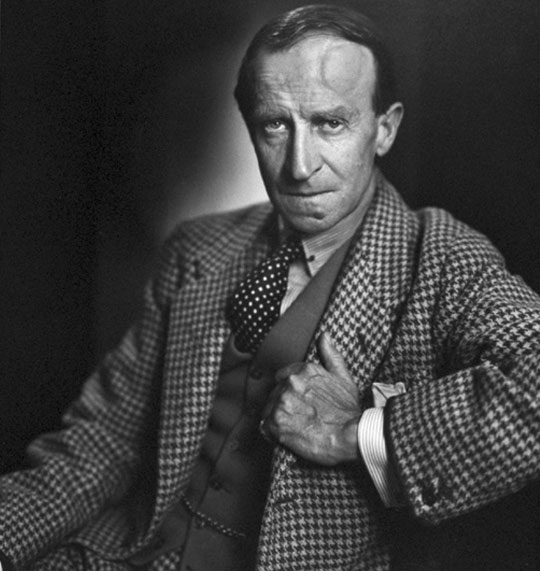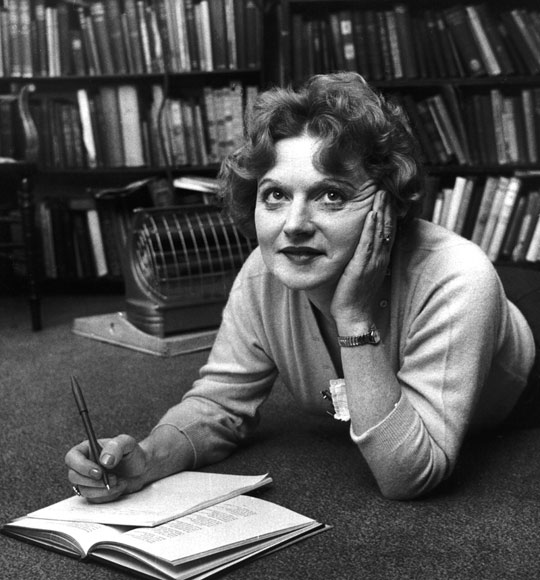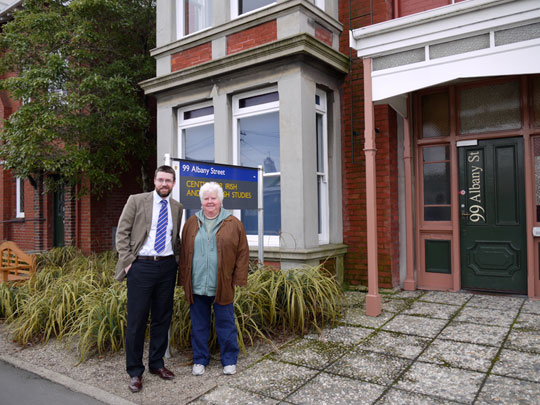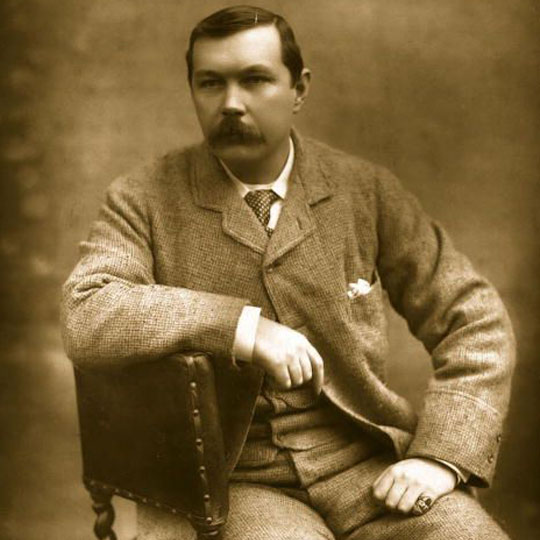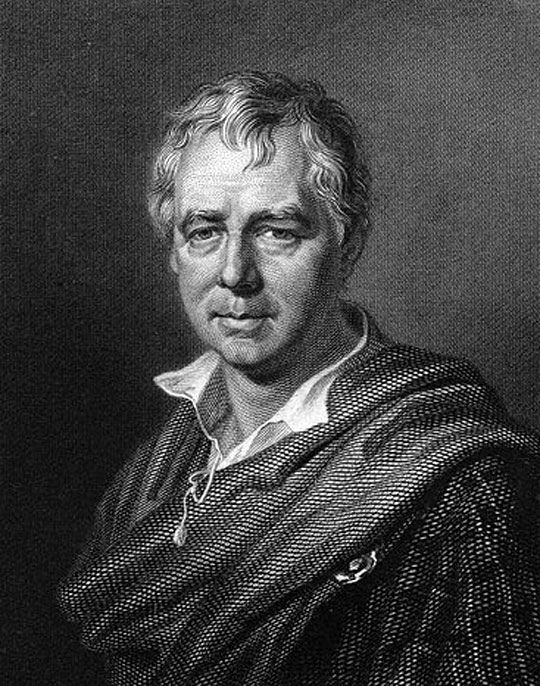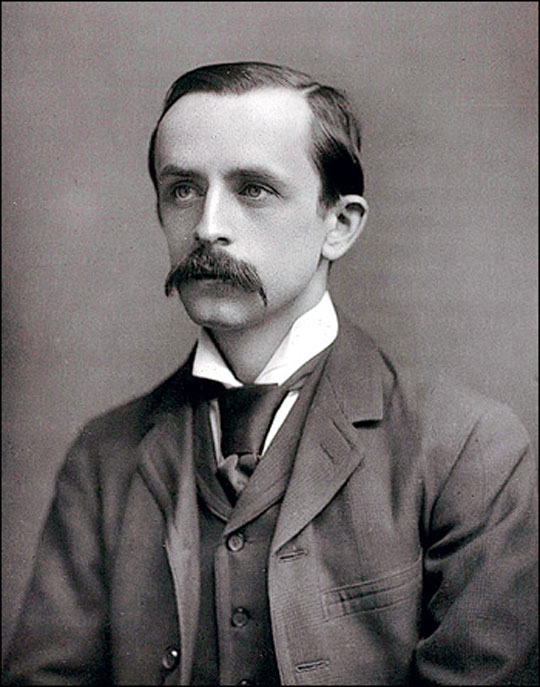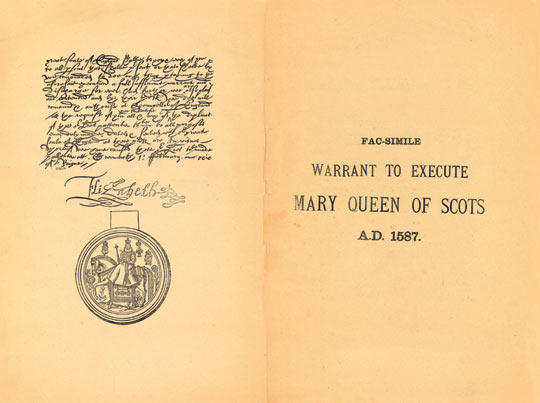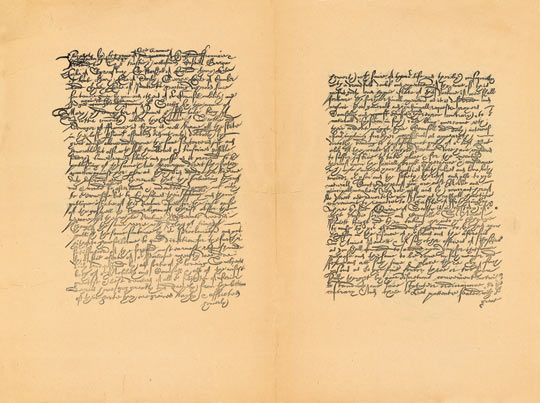Walls
John Buchan (1875-1940)
Buchan was born in Perth in Scotland, the eldest of six siblings. At the age of five he sustained a skull fracture in a carriage accident. The resulting scar is still clearly visible in the photograph above. Trained as a barrister, he found more success as a publisher, writer and politician. He himself said ‘Publishing is my business, writing an amusement and politics my duty.’ His most famous literary work was The Thirty-Nine Steps which was published as a book in October, 1915. From the mid-1920s until 1937, Buchan published at least one novel a year and was also a prolific writer of non-fiction. In 1935 he was created the first Baron Tweedsmuir and in the same year became the Governor-General of Canada, a post he held until his death in 1940.
John Galt (1779-1839)
Born in Irvine on the west coast of Scotland, Galt was a sickly child who stayed at home and despite his mother’s protestations, developed ‘bookish propensities’. Galt was very well-read and impressed James Hogg, the Ettrick Shepherd, at a dinner given by Galt and his friends in Hogg’s honour in 1804. Galt’s works include essays, poems, novels and plays and he was first published in 1812. He was an acquaintance of Lord Byron’s and later went on to write one of the first biographical works on the man. Galt’s works include The Ayrshire Legatees (1821), The Provost (1822) The Entail (1823), and The Radical (1832). He retired to Greenock, a port on the Clyde estuary, in 1834 and died in 1839.

Dame Muriel Spark (1918-2006)
Muriel Sarah Camberg was born in Edinburgh, her father a Scottish Jew and her mother a Christian. She began writing poetry in her early teens at school. At the age of 19 she left Scotland for Southern Rhodesia (now Zimbabwe) to marry Sydney Oswald Spark, thirteen years her senior whom she had met at a dance in Edinburgh. In July of 1938, she gave birth to a son Samuel Robin Spark in Southern Rhodesia and having left the marriage, Spark supported herself and her son there. At the outbreak of W.W. II all civilian passages back to Britain were halted but determined to escape Southern Rhodesia, Spark placed Samuel in a boarding school and boarded a troop ship for Liverpool in 1944. Samuel returned to England in 1945 and was consequently brought up in Edinburgh by Spark’s parents. The most famous of Spark’s novels, The Prime of Miss Jean Brodie, was her sixth and published in 1961. She also wrote poems, plays and children’s books. Dame Muriel Spark died in 2006 in Florence, Italy after suffering years of ill health. In 2008, The Times newspaper in the U.K. placed her eighth in their list of the ‘50 greatest post-war writers.’
Val McDermid
Born in 1955, Val McDermid grew up in Kirkcaldy in Fife which is about 11 miles north of Edinburgh, as the crow flies, across the Firth of Forth. At the age of 17 she attended St. Hilda’s College at Oxford, the first pupil to do so from a Scottish State School. After graduating she became a trainee journalist in Devon and subsequently worked for papers in Glasgow and Manchester.
Her first novel, written when she was 23, was rejected by publishers but encouraged by a friend she rewrote the novel as a play and it was performed by the Plymouth Theatre Company. McDermid’s first published novel was Report for Murder in 1987. She continues to write incredibly successful crime fiction with her most famous characters, psychologist Tony Hill and policewoman Carol Jordan, being immortalised in the television series Wire in the Blood.
McDermid also reviews for various British newspapers and writes for broadcast on BBC Radio 4 and BBC Radio Scotland.
Professor Liam McIlvanney
Liam McIlvanney was born in Kilmarnock, Ayrshire in Scotland. He studied at Glasgow and Oxford and subsequently lectured in English for ten years at the University of Aberdeen. His first novel, All the Colours of the Town, was published in 2009. Professor McIlvanney currently holds the position of Stuart Professor of Scottish Studies at the University of Otago.
Val McDermid and Liam McIlvanney outside the Centre for Scottish Studies, August 2010.
Sir Arthur Conan Doyle (1859-1930)
Arthur Ignatius Conan Doyle was born in Edinburgh, the third of nine children. In the early years of his formal education, missing his family while attending boarding school, he sought succour in the works of Sir Walter Scott, a writer who is thought to have been an enormous influence on Doyle’s later works. Doyle attended Edinburgh University’s medical school, graduated MD in 1885 and began his career in medicine. He was first published in 1879 in the Chambers’s Edinburgh Journal and his first novel The Mystery of Cloomber, although written earlier in his literary career, was not published until 1888. Doyle’s most famous characters, Sherlock Holmes and Dr Watson, first came together in A Study in Scarlet, a story which was published in 1887 and which received generous reviews in The Scotsman and The Glasgow Herald. Throughout his literary career, Doyle was a prolific writer and in the years before his death he indulged his beliefs in Spiritualism- denial of death- and wrote many books on the subject. Sir Arthur Conan Doyle died in Sussex, England in July, 1930.
Sir Walter Scott (1771-1832)
The poet and novelist, Walter Scott, was born in College Wynd in the Old Town of Edinburgh. Scott’s mother bore 13 children, six of whom, including Scott, survived childhood. As a baby Scott contracted polio which left him with permanent lameness in his right leg, a disability which did not prevent him from leading an active life but one which may have contributed to his love of literature. At boarding school in Edinburgh, Scott read the texts of Caesar, Livy, Sallust, Virgil, Horace and Terence. Scott went on to law school and in 1792 passed the Scots law examination of the Faculty of Advocates and was admitted as an advocate. Scott was a very successful novelist even though he always published anonymously and of his 23 novels in total, his most famous include Waverly (1814), Rob Roy (1817), Ivanhoe (1819) and The Fair Maid of Perth (1828). Scott was also known for his poetry, for example The Lady of the Lake (1810). Sir Walter Scott died at his home of Abbotsford in Melrose, about 36 miles south-east of Edinburgh on the banks of the river Tweed in the Scottish borders.
J. M. Barrie (1860-1937)
James Matthew Barrie was born in Kirriemuir, about 15 miles north of Dundee, the ninth of ten children. Even though his family were poor, Barrie was able to attend school and in 1878 matriculated at Edinburgh University and graduated with MA in 1882. Barrie began his early career as a journalist for the Nottingham Journal in 1883 but the journal folded in 1884 and Barrie moved to London in 1885. In the following five years Barrie published six books, many articles and reviews and in the 1890s was well ensconced as a popular novelist, selling over 200,000 copies in the United Kingdom and the United States. Barrie’s most well-known character, Peter Pan, first appeared in 1902 in the book The Little White Bird. Barrie also found success as a playwright and in the years 1901-1904 he wrote and produced Quality Street, The Admirable Crichton, and Peter Pan, the latter being the most successful and the play was performed for many years in London as a Christmas pantomime. Barrie died in London in 1937 and is buried at his birthplace of Kirriemuir in Scotland.
The Flag of Scotland, The Saltire or St Andrew’s Cross
According to tradition, the Flag of Scotland (a blue field with a white saltire) represents Saint Andrew, who was supposed to have been crucified on a cross of that form (called a crux decussata). Also according to legend, it is the oldest continuously used sovereign flag in the world, having been in use since AD 832.
With kind thanks to the Scottish Shop, Dunedin.
Warrant to Execute Mary, Queen of Scots, 1587 (facsimile)
Mary Queen of Scots (1542-1587) was the daughter of James V of Scotland and Mary of Guise, and second cousin to Elizabeth I. Mary was a Catholic who had claim to the crowns of both Scotland and England. She was executed in February 1587 in Northamptonshire, after Elizabeth I, said to have been reluctant to sign the document, authorised her execution. In 2008, the only surviving copy of the warrant was bought by the Church of England for the sum of £73,000.
Declaration of Scottish Independence, 1320 (facsimile)
The Declaration of Arbroath is a declaration of Scottish independence, made in 1320. It is in the form of a letter submitted to Pope John XXII, dated 6 April 1320, intended to confirm Scotland’s status as an independent, sovereign state and defending Scotland’s right to use military action when unjustly attacked. Generally believed to have been written in the Arbroath Abbey by Bernard of Kilwinning, then Chancellor of Scotland and Abbot of Arbroath, and sealed by fifty-one magnates and nobles.
(A translation is given below):
The Declaration of Arbroath (English Translation)
To the most Holy Father and Lord in Christ, the Lord John, by divine providence Supreme Pontiff of the Holy Roman and Universal Church, his humble and devout sons Duncan, Earl of Fife, Thomas Randolph, Earl of Moray, Lord of Man and of Annandale, Patrick Dunbar, Earl of March, Malise, Earl of Strathearn, Malcolm, Earl of Lennox, William, Earl of Ross, Magnus, Earl of Caithness and Orkney, and William, Earl of Sutherland; Walter, Steward of Scotland, William Soules, Butler of Scotland, James, Lord of Douglas, Roger Mowbray, David, Lord of Brechin, David Graham, Ingram Umfraville, John Menteith, guardian of the earldom of Menteith, Alexander Fraser, Gilbert Hay, Constable of Scotland, Robert Keith, Marischal of Scotland, Henry St Clair, John Graham, David Lindsay, William Oliphant, Patrick Graham, John Fenton, William Abernethy, David Wemyss, William Mushet, Fergus of Ardrossan, Eustace Maxwell, William Ramsay, William Mowat, Alan Murray, Donald Campbell, John Cameron, Reginald Cheyne, Alexander Seton, Andrew Leslie, and Alexander Straiton, and the other barons and freeholders and the whole community of the realm of Scotland send all manner of filial reverence, with devout kisses of his blessed feet.
Most Holy Father and Lord, we know and from the chronicles and books of the ancients we find that among other famous nations our own, the Scots, has been graced with widespread renown. They journeyed from Greater Scythia by way of the Tyrrhenian Sea and the Pillars of Hercules, and dwelt for a long course of time in Spain among the most savage tribes, but nowhere could they be subdued by any race, however barbarous. Thence they came, twelve hundred years after the people of Israel crossed the Red Sea, to their home in the west where they still live today. The Britons they first drove out, the Picts they utterly destroyed, and, even though very often assailed by the Norwegians, the Danes and the English, they took possession of that home with many victories and untold efforts; and, as the historians of old time bear witness, they have held it free of all bondage ever since. In their kingdom there have reigned one hundred and thirteen kings of their own royal stock, the line unbroken a single foreigner.
The high qualities and deserts of these people, were they not otherwise manifest, gain glory enough from this: that the King of kings and Lord of lords, our Lord Jesus Christ, after His Passion and Resurrection, called them, even though settled in the uttermost parts of the earth, almost the first to His most holy faith. Nor would He have them confirmed in that faith by merely anyone but by the first of His Apostles -- by calling, though second or third in rank -- the most gentle Saint Andrew, the Blessed Peter's brother, and desired him to keep them under his protection as their patron forever.
The Most Holy Fathers your predecessors gave careful heed to these things and bestowed many favours and numerous privileges on this same kingdom and people, as being the special charge of the Blessed Peter's brother. Thus our nation under their protection did indeed live in freedom and peace up to the time when that mighty prince the King of the English, Edward, the father of the one who reigns today, when our kingdom had no head and our people harboured no malice or treachery and were then unused to wars or invasions, came in the guise of a friend and ally to harass them as an enemy. The deeds of cruelty, massacre, violence, pillage, arson, imprisoning prelates, burning down monasteries, robbing and killing monks and nuns, and yet other outrages without number which he committed against our people, sparing neither age nor sex, religion nor rank, no one could describe nor fully imagine unless he had seen them with his own eyes.
But from these countless evils we have been set free, by the help of Him Who though He afflicts yet heals and restores, by our most tireless Prince, King and Lord, the Lord Robert. He, that his people and his heritage might be delivered out of the hands of our enemies, met toil and fatigue, hunger and peril, like another Macabaeus or Joshua and bore them cheerfully. Him, too, divine providence, his right of succession according to or laws and customs which we shall maintain to the death, and the due consent and assent of us all have made our Prince and King. To him, as to the man by whom salvation has been wrought unto our people, we are bound both by law and by his merits that our freedom may be still maintained, and by him, come what may, we mean to stand.
Yet if he should give up what he has begun, and agree to make us or our kingdom subject to the King of England or the English, we should exert ourselves at once to drive him out as our enemy and a subverter of his own rights and ours, and make some other man who was well able to defend us our King; for, as long as but a hundred of us remain alive, never will we on any conditions be brought under English rule. It is in truth not for glory, nor riches, nor honours that we are fighting, but for freedom -- for that alone, which no honest man gives up but with life itself.
Therefore it is, Reverend Father and Lord, that we beseech your Holiness with our most earnest prayers and suppliant hearts, inasmuch as you will in your sincerity and goodness consider all this, that, since with Him Whose Vice-Regent on earth you are there is neither weighing nor distinction of Jew and Greek, Scotsman or Englishman, you will look with the eyes of a father on the troubles and privation brought by the English upon us and upon the Church of God. May it please you to admonish and exhort the King of the English, who ought to be satisfied with what belongs to him since England used once to be enough for seven kings or more, to leave us Scots in peace, who live in this poor little Scotland, beyond which there is no dwelling-place at all, and covet nothing but our own. We are sincerely willing to do anything for him, having regard to our condition, that we can, to win peace for ourselves.
This truly concerns you, Holy Father, since you see the savagery of the heathen raging against the Christians, as the sins of Christians have indeed deserved, and the frontiers of Christendom being pressed inward every day; and how much it will tarnish your Holiness's memory if (which God forbid) the Church suffers eclipse or scandal in any branch of it during your time, you must perceive. Then rouse the Christian princes who for false reasons pretend that they cannot go to help of the Holy Land because of wars they have on hand with their neighbours. The real reason that prevents them is that in making war on their smaller neighbours they find quicker profit and weaker resistance. But how cheerfully our Lord the King and we too would go there if the King of the English would leave us in peace, He from Whom nothing is hidden well knows; and we profess and declare it to you as the Vicar of Christ and to all Christendom.
But if your Holiness puts too much faith in the tales the English tell and will not give sincere belief to all this, nor refrain from favouring them to our prejudice, then the slaughter of bodies, the perdition of souls, and all the other misfortunes that will follow, inflicted by them on us and by us on them, will, we believe, be surely laid by the Most High to your charge.
To conclude, we are and shall ever be, as far as duty calls us, ready to do your will in all things, as obedient sons to you as His Vicar; and to Him as the Supreme King and Judge we commit the maintenance of our cause, csating our cares upon Him and firmly trusting that He will inspire us with courage and bring our enemies to nought.
May the Most High preserve you to his Holy Church in holiness and health and grant you length of days.
Given at the monastery of Arbroath in Scotland on the sixth day of the month of April in the year of grace thirteen hundred and twenty and the fifteenth year of the reign of our King aforesaid.

